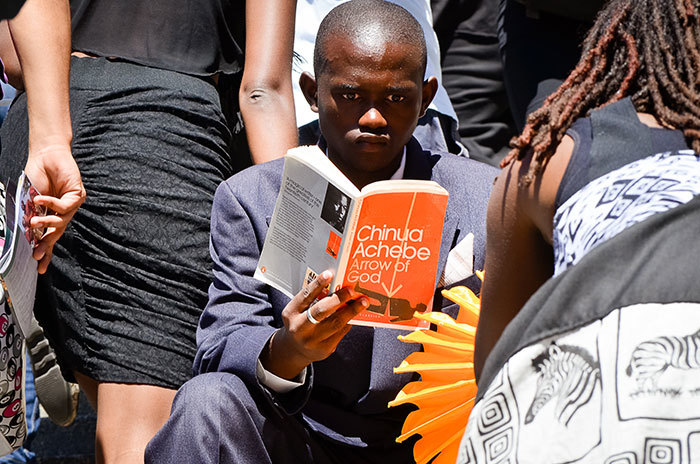What a less Eurocentric reading list would look like
28 July 2015 | Story by Newsroom
The debate about curriculum and staff diversity is gaining momentum at some South African as well as British universities.
Some have challenged the dominance of dead white men in university literary studies departments. But what would a more diverse, less Eurocentric reading list look like in different disciplines? Three academics offer their suggestions.
Sarah Pett, SOAS; University of York (English)
When it comes to teaching, I'm particularly interested in two things. The first is constructions and deconstructions of whiteness and white privilege. The second involves complicating some of the myths that surround canonical texts and contexts.
I'd love to teach Chimamanda Ngozi Adichie's Americanah. Reviews have been mixed, but I lapped this up when I read it. I particularly like how Adichie uses the digital in this novel, and how she frames Peggy McIntosh's white privilege questionnaire. The possibilities for classroom discussion offered by this novel are endless.
I thoroughly enjoyed Carli Coetzee's Accented Futures: Language Activism and the Ending of Apartheid. Its short, wide-ranging chapters are excellent springboards for classroom discussion. The book brings some of the unspoken problems in South African literary and academic culture to the surface.
Reading parts of this alongside older material, like Njabulo S. Ndebele's Rediscovery of the Ordinary (1991), as well as some of the articles that emerged this year around the Franschoek Literary Festival by Thando Mgqolozana, Siphiwo Mahala and Eusebius McKaiser, for instance, would make for a great postgraduate seminar.
My favourite session on the Global Shakespeare module I teach at SOAS has to be the seminar on Shakespeare's Othello. In the UK, we're taught at school that the play is primarily about race and was particularly radical because the early modern audience wouldn't have seen a black person before.
This is completely untrue. The introduction to Gretchen Gerzina's Black London: Life Before Emancipation is a very readable account of how diverse our capital was in Shakespeare's time (and after), while the Walters Art Museum's open access catalogue Revealing the African Presence in Renaissance Europe offers a rich selection of essays and images that further prove this.
Together they provide an accessible and engaging backdrop to classroom discussion, in which we explore how race is in many ways a minor detail in a play centrally concerned with status, gender relations and masculinity.
How studying systems of privilege can strengthen compassion
Nomalanga Mkhize, Rhodes University (History)
I believe the purpose of the university in Africa today is to give students a strong sense of intellectual location on the continent. Ngugi Wa Thiong'o's Decolonising the Mind, Chinua Achebe's Things Fall Apart and Phyllis Ntantala's A Life's Mosaic showed me that to reconstruct Africa we must provoke new social imaginativeness.
Later in life I fell in love with Olive Schreiner's Letters from 1871–99, a remarkable collection that shows she was a formidable intellect and conscience in her time. I am appalled by how South African English departments have depoliticised her.
Lastly, whatever its limits, Christopher Lasch's The Culture of Narcissism reminds us of the shallow social personality produced within us by consumer society to maintain over-indulgent, corporate-driven capitalism that encourages hyper-individualistic mass consumer culture. This culture simultaneously disables our capacity to be resilient, mutually dependent and socially accountable.
Xolela Mangcu, University of Cape Town (Sociology)
One hundred and fifty years of Black intellectual thought remains outside the social theory curriculum in South Africa. I have chosen some of the defining texts of how Black people in Africa and the Diaspora have interpreted the meaning of social existence and out of such processes ultimately gave meaning to the social ideals contained in the South African Constitution.
These social, cultural and political processes of what anthropologist Fernando Ortiz called "transculturation" – merging and converging cultures – are not reflected anywhere in our syllabi. They are not part of oral history but of the literary culture that goes back to the 1840s. The task is to retrieve them. Here is my list:
- The Founders by Andre Odendaal;
- I Write What I Like by Steve Biko;
- Ityala LamaWele by S.E.K. Mqhayi;
- Citizen and Subject by Mahmood Mamdani;
- Black Athena by Martin Bernal;
- The Souls of Black Folk by W.E.B. Du Bois;
- The African Diaspora and the Disciplines by Teju Olanyan and James Sweet.
Written by Nomalanga Mkhize, Lecturer in History at Rhodes University; Sarah Pett Teaching Fellow, SOAS; Teaching Fellow at University of York; and Xolela Mangcu Associate Professor of Sociology at University of Cape Town.
The authors do not work for, consult, own shares in or receive funding from any company or organisation that would benefit from this article, and has disclosed no relevant affiliations beyond the academic appointment above.
|
This article first appeared in The Conversation, a collaboration between editors and academics to provide informed news analysis and commentary. Its content is free to read and republish under Creative Commons; media who would like to republish this article should do so directly from its appearance on The Conversation, using the button in the right-hand column of the webpage. UCT academics who would like to write for The Conversation should register with them; you are also welcome to find out more from carolyn.newton@uct.ac.za. |
![]()
 This work is licensed under a Creative Commons Attribution-NoDerivatives 4.0 International License.
This work is licensed under a Creative Commons Attribution-NoDerivatives 4.0 International License.
Please view the republishing articles page for more information.










